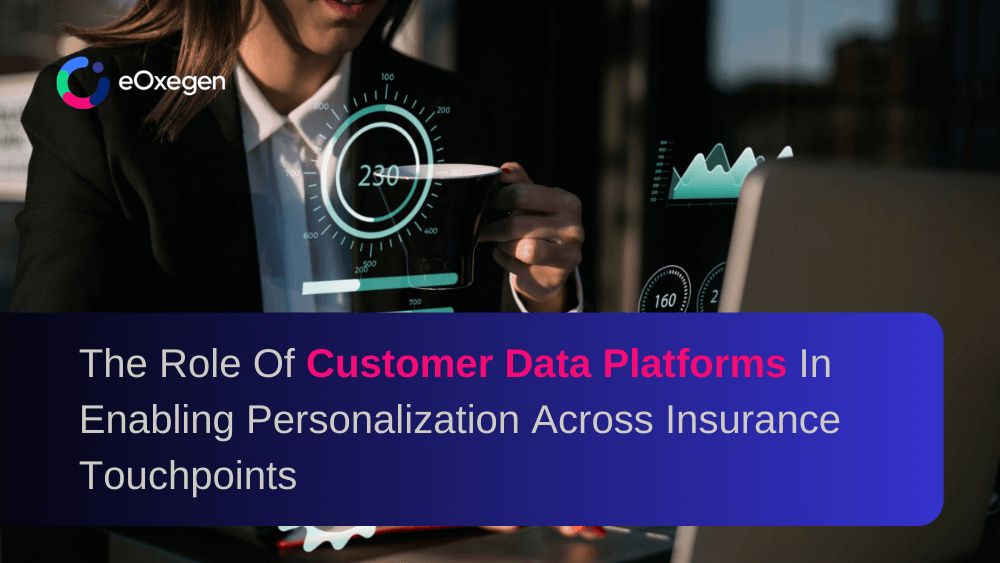The Role Of Customer Data Platforms In Enabling Personalization Across Insurance Touchpoints
12th March, 2024

In today's competitive insurance landscape, providing personalized experiences to customers has become paramount for success. As insurers strive to meet the evolving needs and preferences of their clients, leveraging advanced technologies like Customer Data Platforms (CDPs) has emerged as a game-changer. These platforms enable insurers to harness the power of data to deliver tailored experiences across various touchpoints, revolutionizing the insurance industry.
Understanding the Significance of Personalization in Insurance
In the fiercely competitive insurance industry, differentiation is crucial. Personalization allows insurers to stand out by offering tailored solutions that resonate with each customer's specific requirements. Whether it's customizing coverage options, recommending relevant products, or providing targeted communication, personalized experiences foster stronger connections between insurers and policyholders. This, in turn, leads to higher customer satisfaction, increased customer lifetime value, and ultimately, improved bottom-line results.
The Role of Customer Data Platforms (CDPs) in Insurance
Customer Data Platforms (CDPs) serve as the backbone of personalized experiences in insurance. These sophisticated platforms are designed to aggregate, consolidate, and analyze vast amounts of customer data from disparate sources, including policy information, claims software, CRM systems, and digital touchpoints. By centralizing customer data in a unified repository, CDPs offer insurers a comprehensive view of each customer's journey, preferences, and behaviors.
Harnessing the Power of Data
By harnessing the power of data, CDPs enable insurers to unlock valuable insights that drive personalized interactions across various touchpoints. For example, insurers can leverage AI insurance claims capabilities to predict customer needs, identify cross-selling opportunities, and proactively address potential risks. Furthermore, CDPs empower insurers to deliver relevant and timely communication, whether it's through targeted marketing campaigns, personalized policy recommendations, or proactive claims management.
Enhancing Operational Efficiency
Beyond driving personalized experiences, CDPs also streamline operational processes within insurance organizations. By automating data integration, cleansing, and analysis, these platforms enable insurers to improve data accuracy, reduce manual errors, and enhance overall efficiency. Moreover, by providing real-time access to actionable insights, CDPs empower underwriters, claims adjusters, and customer service representatives to make informed decisions quickly and effectively.
As customer expectations continue to evolve, the role of personalization in insurance will only grow in significance. Insurers that embrace Customer Data Platforms and leverage advanced analytics capabilities will be better positioned to meet the evolving needs of their customers and gain a competitive edge in the market. By delivering tailored experiences that resonate with policyholders, insurers can drive customer satisfaction, loyalty, and long-term profitability.
Key Benefits of CDPs in Insurance
360-Degree Customer View
CDPs enable insurers to create a comprehensive profile of each customer by aggregating data from disparate sources. This 360-degree view allows insurers to understand customer preferences, behaviors, and life events, enabling personalized engagement and targeted marketing efforts.
Predictive Analytics
By leveraging advanced analytics and AI insurance claims capabilities, CDPs empower insurers to anticipate customer needs and preferences. Insurers can use predictive models to identify cross-selling and upselling opportunities, proactively address customer concerns, and mitigate risks.
Enhanced Customer Engagement
Insurance underwriting platforms integrated with CDPs streamline underwriting and claims processes by providing real-time access to customer data. This allows insurers to expedite decision-making, improve operational efficiency, and enhance the overall customer experience.
Future Outlook
As technology continues to evolve, the role of Customer Data Platforms in enabling personalization across insurance touchpoints will only grow in importance. Insurers that invest in CDPs and embrace data-driven personalization strategies will be better positioned to meet the evolving needs of customers and maintain a competitive edge in the insurance market.
Conclusion
Customer Data Platforms play a crucial role in enabling personalized experiences across insurance touchpoints. By aggregating customer data, leveraging AI insurance claims capabilities, and streamlining operations, CDPs empower insurers to deliver tailored solutions that meet the unique needs of each customer. As insurers continue to prioritize personalization, CDPs will remain a cornerstone of their digital transformation journey.
Recent Articles
- How do Big Insurers Engage with the New-Age InsurTech Companies?
- Insurance Management System Integration: Maximizing Efficiency and Performance
- Will Blockchain Technology Reshape the Insurance Market?
- The Future of Health Insurance: Predictive Analytics and AI
- Buy or Build Insurance Software? A Game-Changing Question in Insurance Industry